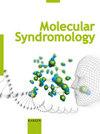A Deeper Insight into <i>COL4A3</i>, <i>COL4A4</i>, and <i>COL4A5 </i>Variants and Genotype-Phenotype Correlation of a Turkish Cohort with Alport Syndrome
IF 0.9
4区 医学
Q4 GENETICS & HEREDITY
引用次数: 0
Abstract
Introduction: Alport syndrome (AS) is an inherited, rare, progressive kidney disease that affects the eye and ear physiology. Pathogenic variants of COL4A5 account for 85% of all cases, while COL4A3 and COL4A4 account for the remaining 15%. Methods: Targeted next-generation sequencing of the COL4A3, COL4A4, and COL4A5 genes was performed in 125 Turkish patients with AS. The patients were compared to 45 controls and open-access population data. Results: The incidence of AS variants in patients was found as 21.6%. 27 variants were identified as pathogenic/likely pathogenic, 28 as variant of uncertain significance, and 52 as benign/likely benign. We also found 31 novel variants (14 in COL4A3, 6 in COL4A4, and 11 in COL4A5) of which 27 were classified as pathogenic/likely pathogenic. Pathogenic/likely Pathogenic variants were most commonly found in the COL4A5 gene, consistent with the literature. This study contributed novel variants associated with AS to the literature. Conclusion: Genetic testing is a crucial part for the diagnosis and management of AS. Studies on the genetic etiology of AS are limited for the Turkish population. We believe that this study will contribute to the literature and the clinical decision-making process of patients with AS and emphasize the importance of genetic counseling.土耳其Alport综合征人群<i>COL4A4</i> <i>和<i>COL4A5 </i>变异和基因型-表型相关性的深入研究
& lt; b> & lt; i>简介:& lt; / i> & lt; / b>阿尔波特综合征(AS)是一种遗传性、罕见的进行性肾脏疾病,会影响眼睛和耳朵的生理机能。COL4A5</i>占所有病例的85%,而<i>COL4A3</i>和& lt; i> COL4A4< / i>占剩下的15%。& lt; b> & lt; i>方法:& lt; / i> & lt; / b><i>COL4A3</i> <i>和<i>COL4A5</i>对125例土耳其AS患者进行了基因分析。将这些患者与45名对照组和开放获取的人群数据进行比较。& lt; b> & lt; i>结果:& lt; / i> & lt; / b>患者中AS变异的发生率为21.6%。27个变异被确定为致病/可能致病,28个为意义不确定的变异,52个为良性/可能良性。我们还发现了31个新的变异(14个在<i>COL4A3</i>, 6个在<i>COL4A4</i>, 11个在<i>COL4A5</i>),其中27个被归类为致病性/可能致病性。致病性/可能致病性变异最常见于COL4A5</i>吉恩,与文献相符。本研究为文献提供了与AS相关的新变异。& lt; b> & lt; i>结论:& lt; / i> & lt; / b>基因检测是诊断和治疗AS的重要手段。对土耳其人群的遗传病因的研究是有限的。我们相信本研究将有助于文献和AS患者的临床决策过程,并强调遗传咨询的重要性。
本文章由计算机程序翻译,如有差异,请以英文原文为准。
求助全文
约1分钟内获得全文
求助全文
来源期刊

Molecular Syndromology
Biochemistry, Genetics and Molecular Biology-Genetics
CiteScore
1.70
自引率
9.10%
发文量
67
期刊介绍:
''Molecular Syndromology'' publishes high-quality research articles, short reports and reviews on common and rare genetic syndromes, aiming to increase clinical understanding through molecular insights. Topics of particular interest are the molecular basis of genetic syndromes, genotype-phenotype correlation, natural history, strategies in disease management and novel therapeutic approaches based on molecular findings. Research on model systems is also welcome, especially when it is obviously relevant to human genetics. With high-quality reviews on current topics the journal aims to facilitate translation of research findings to a clinical setting while also stimulating further research on clinically relevant questions. The journal targets not only medical geneticists and basic biomedical researchers, but also clinicians dealing with genetic syndromes. With four Associate Editors from three continents and a broad international Editorial Board the journal welcomes submissions covering the latest research from around the world.
 求助内容:
求助内容: 应助结果提醒方式:
应助结果提醒方式:


